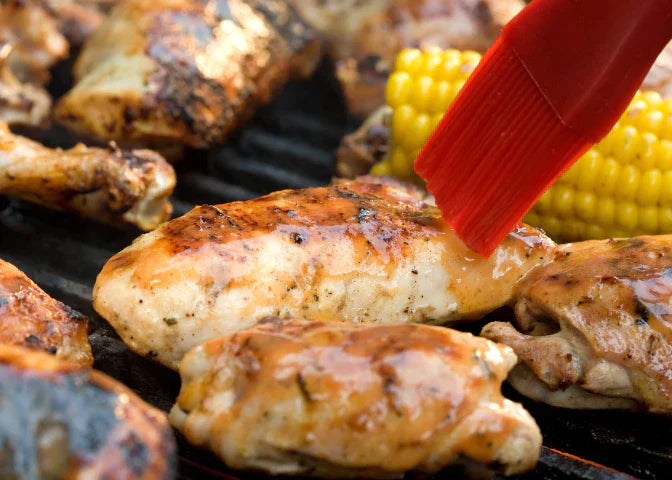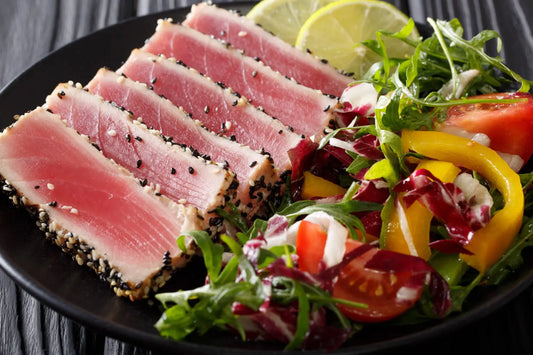Brining is a simple yet delicious way of preparing meat so it’s more tender, succulent, and juicy before you prepare to cook it. Before we get to the brine, let’s talk about what it actually is. Brining is basically the process of submerging meat or poultry in a solution. The solution is usually salt and water, but it can also be low in salt, just like this recipe.
During brining, the saltwater and meat come together to trap the liquid in the meat so it can’t evaporate while cooking. This ends up creating a juicy and tender piece of meat or poultry. Some people often confuse brining with marinading, and it is important to understand the difference. While brining is mainly for moisture, using a marinade adds flavor.
We will share 2 of our favorite and most popular low-sodium brine recipes, one that works best for chicken and another all-purpose poultry and pork brining recipe. So, let’s get started.

Chicken Brine
Before you get into the kitchen and start making the brine, here are the ingredients you will need:
- 1 gallon of warm water
- 3/4 cup of kosher salt
- 2/3 cup of sugar
- 3/4 cup of soy sauce
- 1/4 cup olive oil
Once you’ve gathered the ingredients, here’s what you need to do:
- Start by pouring the water into a container. Make sure the container is 2 x the size of the volume of water.
- Next, pour in the salt, sugar, soy sauce, and olive oil.
- Stir the mixture until the sugar and salt have fully dissolved.
- Once mixing is complete, let the brine rest and cool at room temperature.
- Now, grab your chicken and place it in the brine.
- Cover it and place the container in the refrigerator for 2 hours if you’re using skinless breasts and 4 hours for bone-in pieces. If it’s a whole chicken, leave it in the fridge overnight.
- 1 gallon of brine is good enough for 6 pounds of whole chicken or bone-in pieces. It can also hold up to 10 pounds of skinless, boneless chicken breasts.
This is a very simple and effective low-sodium brine recipe you can easily prepare to brine your chicken. The nutritional facts for this recipe are as follows: Calories 182.5, carbohydrates 24.7 g, cholesterol 0 mg, fat 9 g, fiber 0.3 g, protein 2 g, saturated fat 1.2 g, sodium 13209.3 mg, sugar 22.7 g.

All-purpose mild brine for poultry and pork
The next brine recipe is an all-rounder for basically all kinds of poultry and pork. It’s mild and brines your meat just right, especially if you’re tossing it on the grill or in the smoker. This brine ensures juicy and tender meat. Here are the ingredients you will need:
- 1/4 cup kosher salt
- 2 tablespoons sugar
- 1-quart water
As you can see, there are only a few ingredients needed to make this brine, so it should be a simply fair process. Here’s it is:
- Start by mixing cold water with the salt and sugar.
- Stir the mixture until the salt and sugar have completely dissolved.
- Immerse the meat in a non-reactive container (e.g., plastic).
- Seal the container and put it in the refrigerator.
- Use 1 quart of brine per pound of meat, be sure not to exceed 2 gallons.
- The brining time is 1 hour per pound. However, make sure it’s not less than 30 mins and not more than 8 hours.
- It’s crucial to make sure that the meat is not frozen.
The brine is simple, and once it’s done, you’re guaranteed the juiciest meat ever. The nutritional information for this brine is as follows: Calories 97.5, sodium 2832.2mg, carbohydrates 25.2, sugar 25.1.
There are endless other recipes, and it is easy to brine your own chicken and poultry. Some recipes recommend putting the chicken and brining solution in the fridge for at least 8 hours up to b24 hours, and many ask you to rinse the chicken before throwing it in the smoker. At the end of the day, it all comes down to your preference.
And if for some reason you can’t decide which brine to go for, or if you’ve never brined your meat or poultry before, that is why we have given you 2 of the best and most delicious recipes to start off your brining journey. We’re sure you will enjoy it and come back again for the same recipe.
Final Thoughts
These two brines add salt in just the right amounts directly into the chicken or other meats and keep them in the fridge for the ideal amount of time. The end result is juicy, succulent, and tender poultry that will exceed all your expectations.
Check out our entire catalog of articles on brining and curing your meat here:
What’s the Difference Between Pickling, Brining, Marinating, and Curing?
Curing and Smoking Meats for Home Food Preservation
Directions On Brining And Curing Your Meat For Food Smoking
For more great ideas on how to get the most out of your Bradley Smoker, check out the awesome articles on our Bradley Smoker Food Smoking Blog for more tips & tricks.




